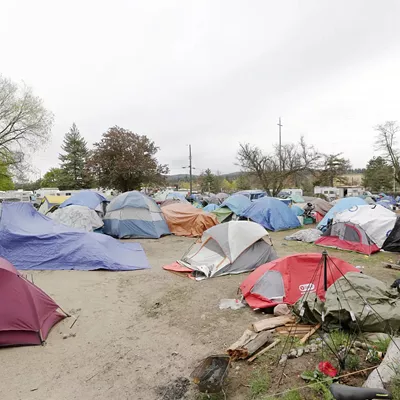Last Whistlestop -- REARDAN, Wash. -- The Inland Empire Railway Historical Society (IERHS) has found a new home in this small Eastern Washington town northwest of Spokane.
The train buffs who run IERHS on a voluntary basis have made their home at the Spokane Interstate Fair & amp; Expo Center for the last 30 years. IERHS has accumulated several full-size rail cars, a couple of locomotives, the last existing Spokane trolley, two large railroad cranes and a huge library of railway books, maps and memorabilia.
When the IERHS was evicted by the fairgrounds board last summer, the problem was not just to find a new home with room for all the stuff, but also to find a place that is connected to the fairgrounds by railroad track.
"A number of communities wanted the museum," says Dale Swant, Reardan Chamber of Commerce president. "The final competition boiled down to a choice between Rosalia and Reardan."
IERHS will locate on 30 acres north of the junction of U.S. Highway 2 and State Route 231, approximately two miles west of Reardan.
"The Palouse Falls and Coulee City Railroad granted permission for the Society to install a switch and spur on the site," says Swant. The same railroad will also help IERHS run an excursion train between Reardan and Coulee City.
Swant says not only the exhibit but especially the summer excursion train will become a major attraction. "Although it will originate in Reardan, it will be an economic asset for every town along the route," he says.
The groundbreaking ceremony is Friday, Feb. 28, at 1 pm on the site, followed by a reception at the Reardan Community Hall. Call: 509-796-2102.
Commuter Questions -- SPOKANE - Here's a new idea: Your daily commute could actually benefit the community. The Spokane Regional Transportation Council (SRTC) wants you to join a study to examine growing traffic on the South Hill, in the Carnahan and Glenrose areas, and the west side of the Spokane Valley.
SRTC is conducting a Southside Transportation Study, which gathers community input to help determine common travel patterns in the area.
"With the help of citizen input," says Glenn Miles, transportation manager of SRTC, "we'll take a look at the increase in travel in the study area and hear if the public's travel needs are currently being met."
SRTC will organize the data and present its findings during a second round of meetings. This presentation will be a public forum designed to answer the question, "What, if anything, should we do about the transportation system on the South Side?"
Meetings are held at Chase Middle School, 4747 E. 37th, on Thursday, Feb. 27, and at the Educational Service District, 4202 S. Regal, on Tuesday, March 4, both from 5:30-7:30 pm. South Hill residents can participate online at www.srtc.org.
Phone Home -- SPOKANE -- The Spokane Police Department has started giving out phone cards to youth ages 15-20 -- not so they can call friends, but so they can call for help if they get in trouble.
The cards are part of the Driving for Life program, funded by a two-year, $250,000 grant from the National Highway Traffic Safety Administration.
The idea is that kids who don't have cell phones will use the cards to call for a ride instead of driving under the influence, says Melanie Rose, spokeswoman for the Spokane Regional Health District.
"We hope that the people we give them to will use them as intended," says Rose, who realizes that the cards could potentially be misused.
The cards are given out by motorcycle cops, a simple act that also gives them a chance to talk to youth about impaired driving, says Rose.
These officers are part of the "emphasis patrol," which is the primary focus of the grant. They target the Division/Ruby Street Corridor and other areas known to have a lot of youth drivers, especially on the weekends.
Recent surveys show that 90 percent of Spokane teens say it's "never okay" to drink and drive, but 39 percent reported riding in a car driven by someone who had been drinking in the past 30 days, and one in seven said they had driven a car after drinking.
"This is just a way to give Spokane youth one more tool to help them get out of a dangerous situation," says Rose.
The phone cards are also available by request from the Spokane Police Department. Call: 835-4594.
Publication date: 02/27/03



















